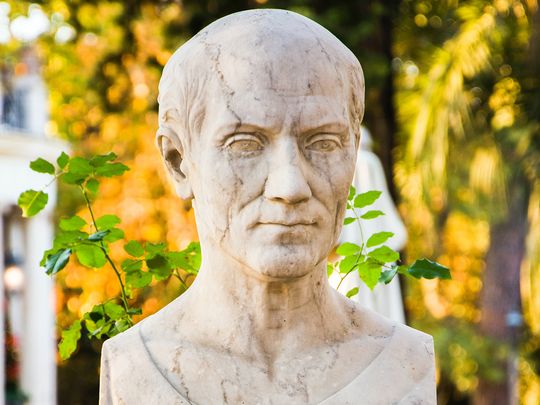
You likely know about ancient Greek thinker Archimedes through a snapshot in time: The image of a man jumping out of his bath and running down the street, shouting, “Eureka!” (which translates to “I have found it!”). But he was so much more.
Click start to play today’s Crossword, where we see other facets of the famous mathematician and engineer, from his ‘sass’ to his immovable devotion to knowledge.
That snapshot of Archimedes is a story that’s been told over and over again in history. Archimedes was given the task of finding out whether a crown had been made with solid gold, or whether the craftsman had substituted some of the gold for silver, keeping the rest for himself. His goal was to calculate the volume of the irregularly shaped crown, without damaging it.
Thinking about the problem even in the bath, Archimedes observed that his own body displaced a certain volume of water when he was submerged in the tub – and this same principle could apply to the crown. With his ‘eureka’ moment, Archimedes found the crown’s volume, which he then used to divide its mass and find its density.
Hailing from Syracuse on the south-east coast of Sicily, Archimedes was much more than an eccentric genius. When the Romans rose to prominence and laid siege to Syracuse in 213BC, they thought it would only take a few days for the coastal city to fall. The Roman fleet blockaded the area and approached to strike.
But Syracuse held out against them for months on end, thanks to a little help from Archimedes, who was by then, in his 70s. He applied his vast knowledge to practical and real problems, giving Syracusans might and power that the world had never seen before.
For instance, Archimedes improved the design of the city’s catapults – these machines were able to target Roman ships that were further away, with much better accuracy. Smaller catapults were also installed along the walls, so that they could target any Roman ships that got too close for comfort. In one epic instance, Archimedes invented crane-like machines that could be extended out over the city’s walls and swung around in an arc. If a ship approached, one of these cranes could be positioned over it, and a pulley could be used to release massive stones from its front end, which would completely eviscerate the ship and everything in it.
Another one of his war-time inventions that the Romans dreaded was known as ‘the claw’. It didn’t just have stones that battered the enemy fleet, but also a huge metal claw that could be dropped via a pulley system to crash into the ship’s deck. The claw could then hoist the entire ship out of the water, shaking off people and cargo, and breaking into pieces.
Needless to say, the Romans didn’t expect such a severe counter-attack. Roman commander Marcellus wryly noted: “Archimedes uses my ships to ladle sea water into his… cups.”
The historian Polybius, wrote in his Histories, about Archimedes’ impact: “The Romans at least, strong as they were both by sea and land, had every hope of capturing the town at once if one old man of Syracuse were removed; but as long as he was present, they did not venture even to attempt to attack in that fashion in which the ability of Archimedes could be used in the defence.”
Eventually, however, the Romans exploited a weakness in one of the defensive walls of Syracuse, while they were busy celebrating a religious festival. They got through and took the city. Marcellus is said to have ordered his soldiers to capture Archimedes alive – since he valued his genius – but when a Roman soldier stumbled across the old inventor, and ordered him to come along, Archimedes refused to get up immediately, since he was engrossed in a mathematical problem. He insisted on finishing his work. The hot-blooded Roman soldier didn’t like his impudence, and killed him. Marcellus was said to have been devastated by the news – he even paid homage to Archimedes’ family.
What do you think of this ancient genius? Play today’s Crossword and tell us at games@gulfnews.com.



